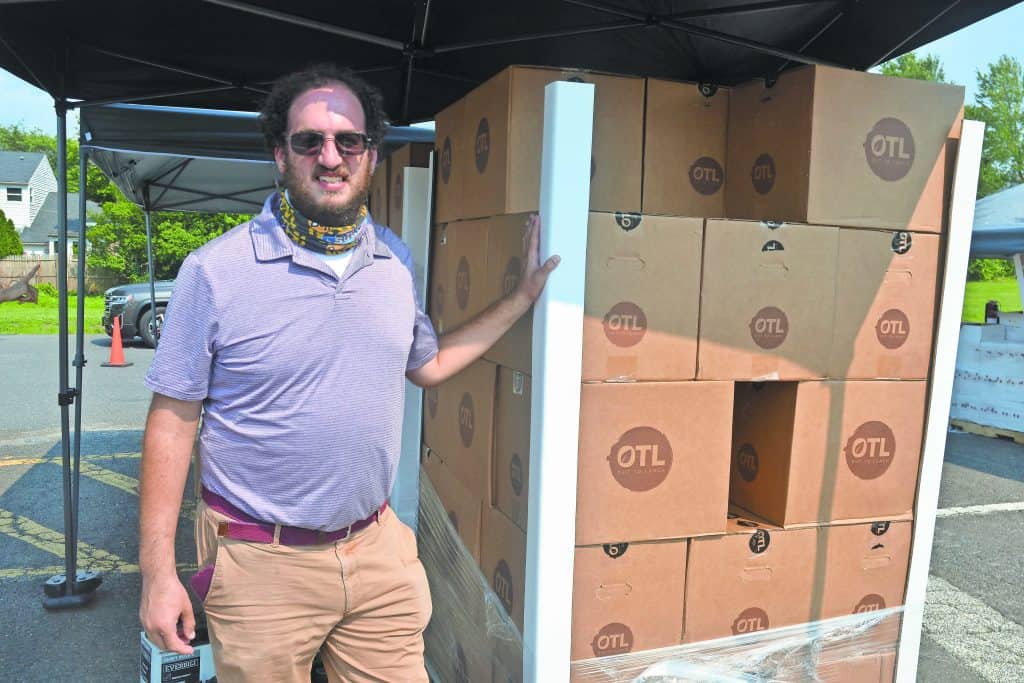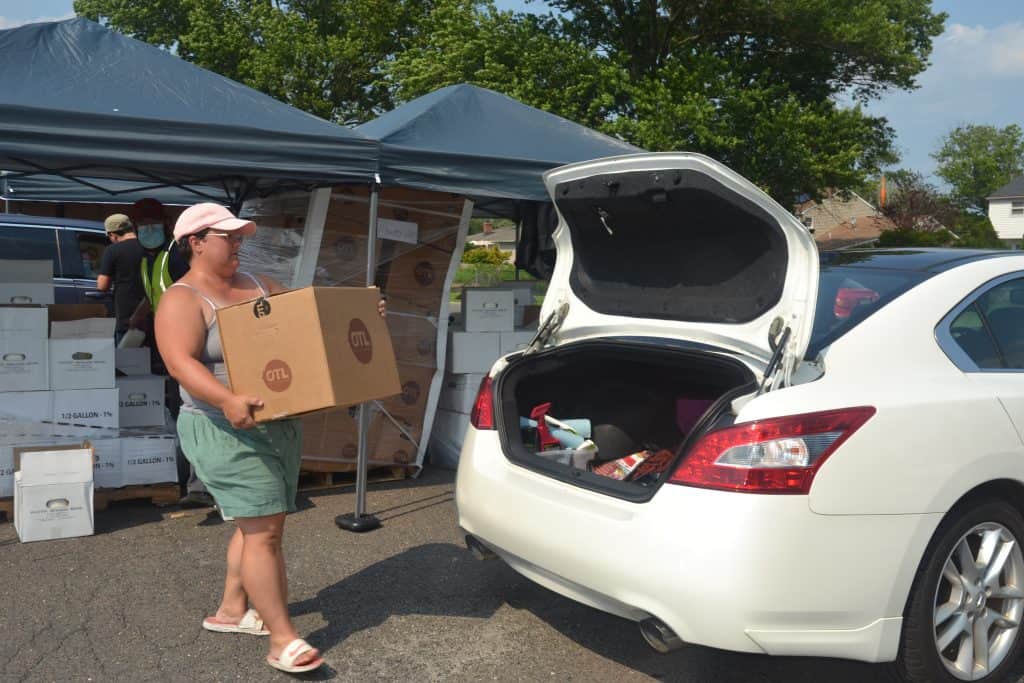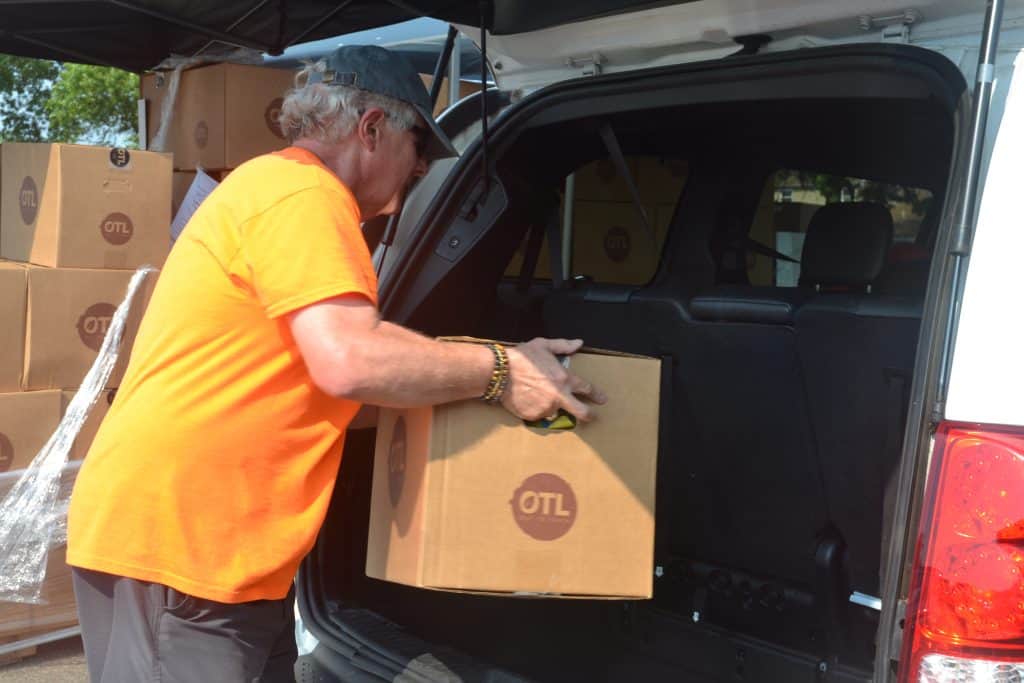

Just prior to the 4th of July weekend last year, Teach Coalition and one of its member programs, Teach NJ, held a food distribution event for families adversely affected by the pandemic at Young Israel on Cooper Landing Road in Cherry Hill.
In charge of logistics on a sweltering late afternoon was township resident and activist Yoni Yares, whose phone appeared to be welded to his ear as he fielded calls and directed traffic in the narrow space for dropoff and pickup. The total delivery amount was expected to be in the neighborhood of 700 to 1,000 large boxes of meals, with 300 to 500 families receiving the goods.
Flash forward one year and Yares was in charge once more, unloading boxes and directing traffic on a sweltering July 6. But this time, he had a larger space to work in, the parking lot of Joyce Kilmer Elementary School.
More than 500 boxes of food were delivered to Kilmer. With five lanes of constant traffic over a two-hour period, and with 600 families registered to be served, most of the food — as well as all of the supplemental boxes of
milk — was distributed.
Lost in the maelstrom of check-ins and load-outs and about a dozen volunteers was the fact that Yares recently reached a distribution milestone of one million meals and kept on going.
“I did reflect on it, and was trying to figure out what comes next. This program comes to an end in its current cycle at the end of August,” Yares said. “Our funding has not been renewed yet.
“We’re looking at how we can start advocating, and how we can start telling the Biden Administration that we need them to open up the funding,” he added, “because otherwise there’s a massive gap.”
Yares estimated that this year’s undertaking serves 3,000 children per week, which covers gaps in the dietary needs of certain youngsters that the school district’s regular Monday meal distribution cannot.
“People still need help,” he explained. “People are still losing jobs. The economic impact (of COVID) is still going on. People who may have gone back to work, you’re looking at only making a third or two-thirds of what they were making.”
Last year, the food distribution was centered around Jewish and Muslim families and four strategic locations throughout the state, It provided two meals, breakfast and lunch, for an entire week. The weekday box featured kids’ food like pizza and paninis. The Shabbat box, preferred by Orthodox families, featured cholent (a Jewish stew), challah, fruit and kugel.
This year, Yares wanted to cover anyone of any faith who expressed a need, and that responsibility required a larger space for operations.
“We realized it was inefficient for us to keep doing the old site pattern up at Young Israel. It wasn’t doable,” he noted. “So we reached out to the school district and asked if we could use Kilmer as a site, and they were gracious enough to let us have it. And we just took off.”
In addition to Kilmer, there’s a sister site that also operates on Tuesdays at the Chabad of Camden and Burlington counties on Kresson Road. And there’s also a dinner distribution box for families who can’t make it on Tuesdays.
“If people can’t come to the schools for pickup on Monday, they come to us on Tuesdays,” Yares stated. “It’s all about getting food into people’s mouths.”
By the time last summer’s distribution ended, an estimated 100,000 meals were handed out. Yares figured that due to the larger space, meaning more families served at one time, roughly 100,000 meals were distributed in a single month. The distribution passed 500,000 meals back in January, and in late June, could claim over one million served.
Greg Bruno, a longtime township resident, showed up on a day when the mercury soared well above 90. Clad in an orange shirt, he directed vehicles, greeted drivers and passengers and chipped in every so often by depositing boxes in back seats and trunks. Every now and then, Bruno ducked under the canopies protecting the pallets of boxes from the elements, to douse himself with a generous portion of cold water.
“This is for him (Yares),” Bruno said. “He asked for help. I’m retired, so why not? (Yoni) asked me to volunteer a couple months ago and also today. “I started doing this during the pandemic, because it was outdoors and I could do something.
 “I didn’t want to be inside,” Bruno added. “So here I am.”
“I didn’t want to be inside,” Bruno added. “So here I am.”
And there they were. Dozens of cars, trucks, vans and sport utility vehicles lined up for themselves or friends and neighbors. For all the hard work and dedication, Yares said he had no clue a simple act of quelling hunger could yield such exponential growth.
“We had no idea,” he acknowledged. “The biggest thing when we first got this whole thing going was (to provide) accessible food, and that we’d find a way to support everyone’s religious dietary needs.
“Now we have to find a way to keep it going.”









